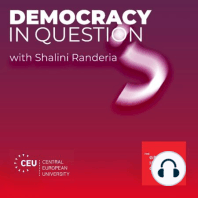25 min listen

Mary Kaldor on NATO, Human Security, the Changing Face of Global War and the Effectiveness of Sanctions and Debt Cancellation
Mary Kaldor on NATO, Human Security, the Changing Face of Global War and the Effectiveness of Sanctions and Debt Cancellation
ratings:
Length:
40 minutes
Released:
Aug 17, 2022
Format:
Podcast episode
Description
Guests featured in this episode:Mary Kaldor, Professor Emeritus of Global Governance and Director of the Conflict Research Programme at the London School of Economics and Political Science. She has had a long and illustrious academic career but has also been an activist since the 1980s. She was a founder of the European Nuclear Disarmament Movement, was co-chair of Helsinki Citizens Assembly and Peoples Europe, and was a member of the Goldstone Commission investigating the Kosovo crisis. She has co-edited several influential volumes, on Dealignment and The New Détente, both with Richard Falk; on Restructuring the Global Military Sector; on Democratization in Central and Eastern Europe; and most recently, on EU Global Strategy and Human Security (2018). She is author of the agenda-setting book Global Civil Society: An Answer to War, Human Security: Reflections on Globalization and Intervention, and highly acclaimed New and Old Wars: Organized Violence in a Global Era. GLOSSARYWhat was the Helsinki Accords (Agreement)? (00:5:20 or p.2 in the transcript)Helsinki Accords, also called Helsinki Final Act (August 1, 1975), major diplomatic agreement signed in the capital Of Finland, Helsinki, at the conclusion of the first Conference on Security and Co-operation in Europe (CSCE; now called the Organization for Security and Co-operation in Europe). The Helsinki Accords were primarily an effort to reduce tension between the Soviet and Western blocs by securing their common acceptance of the post-World War II status quo in Europe. The accords were signed by all the countries of Europe (except Albania, which became a signatory in September 1991) and by the United States and Canada. The agreement recognized the inviolability of the post-World War II frontiers in Europe and pledged the 35 signatory nations to respect human rights and fundamental freedoms and to cooperate in economic, scientific, humanitarian, and other areas. The Helsinki Accords are nonbinding and do not have treaty status. Source: What is the theory of nuclear deterrence? (00:21:42 or p.5 in the transcript) The strategic concept of nuclear deterrence aims to prevent war. It is the justification virtually every nuclear state uses for maintaining nuclear arsenals. The concept of nuclear deterrence follows the rationale of the ‘first user’ principle. States reserve the right to use nuclear weapons in self-defence against an armed attack threatening their vital security interests. Possession of nuclear weapons could be seen as the ultimate bargaining tool in international diplomacy, instantly giving any nuclear state a seat at the top table. The possession of nuclear weapons is repeatedly attacked on the grounds of morality, national credibility, legality, and cost. Nonetheless, proponents of deterrence theory generally draw on one primary argument: its efficacy as a war-prevention mechanism. A notable author in the field, Kenneth Waltz, argues that nuclear deterrence bolsters state security by alleviating the prospect of direct attack, essentially ensuring peace through fear of retaliation. It is argued that the nuclear deterrence developed between the USA and the USSR – the belief that any nuclear attack would lead to massive nuclear retaliation and ‘mutually assured destruction’ – avoided nuclear war and maintained the temperature between the 1950s and 1990s. The continued nuclear deterrence prevented war between the USA and USSR, and has maintained the West’s longest ever period of peace, in the years that followed. It has been noted that no direct conflict has ever broken out between two nuclear-armed states. On these grounds, a small number of proponents maintain that the possession of nuclear proliferation should not be limited to a select few, ‘superior’ states. At present, countries possessing a nuclear deterrent are thought to exert an unfair advantage on the global stage, leaving vulnerable countries relatively unprepared (and reliant on nuclear states) in the ev
Released:
Aug 17, 2022
Format:
Podcast episode
Titles in the series (77)
When and how is power visible in politics? by Democracy in Question?